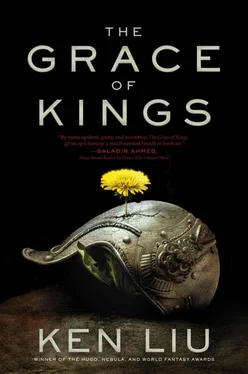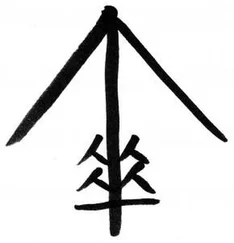The infantry formed phalanxes, fronted by pikemen to unseat the riders from their horses. To the sides were lines of longbowmen, prepared to launch their deadly missiles long before the riders got close. And in the wings were the cavalry, ready to circle around Mata Zyndu to cut off his retreat.
Kuni’s army outnumbered Mata’s attackers ten to one.
“Will you speak to the soldiers?” asked Than Carucono.
Kuni shook his head and turned away from the neat formations arrayed in front of him.
“Is something bothering you, Lord Garu? Do you think our preparations inadequate?”
Kuni shook his head again.
“Yet your look…” Carucono hesitated. “Forgive me, but I believe you’re sad.”
“I am thinking of another time,” Kuni said. “Perhaps a better time.” And he would speak no more.
This would be the day that the mighty hegemon would finally fall.

And then there they were, great clouds of dust and the sound of thousands of horses panting and neighing as they drew near. The five thousand attackers, true to the code of Mata Zyndu, did not deviate from their course as they plowed straight toward the center of Kuni Garu’s defensive formation, the densely packed phalanxes of infantry.
The Dasu longbowmen and spearmen unleashed their missiles as the riders got into range, and the sky darkened as clouds of arcing projectiles momentarily obscured the sun. Many of the arrows and spears hit their marks, and some of the riders fell from their horses, lifeless, unmoving. But other riders ignored the arrows that pierced their armor and kept on coming.
Closer and closer they rode. The ground shook. But the armored and masked riders were eerily silent. There were no battle cries. They pushed on relentlessly, fearless of the dense forest of deadly spikes that the pikemen raised in front of the infantry, their shafts braced firmly into the ground, the tips leaning forward, ready to skewer both men and horses by their own momentum.
Like a wave breaking against the craggy shores of fog-shrouded Faça, the riders of Mata Zyndu burst against the phalanxes of Kuni Garu. The air was filled with the screams of dying horses as the pikes impaled them.
Men fell from their steeds. But the horsemen behind them kept on coming, keeping up the pressure. They leapt over their dead comrades or rode roughshod over them, using their bodies as stepping-stones to break through the wall of pikemen. The center of Kuni Garu’s formation was slowly pushed back, as the pikemen dropped their weapons and unsheathed their short swords to join the infantry in hand-to-hand combat.
The sides of Kuni Garu’s formation of foot soldiers began to envelop and surround the riders like soft dough wrapping around a dollop of stuffing. Kuni’s cavalry rode behind the last of Mata’s riders and closed the circle. Mata Zyndu had nowhere to go.
Mata faced ten times as many men as he had under his command; the hegemon’s valor would not save him. Even if each of his soldiers were a berserker and fought with the strength of three, they would still all leave their bones on the battlefield today. Kuni’s men rejoiced and shouted, anticipating victory.
But those closest to the surrounded Cocru riders realized that something was wrong. The men on the horses made no attempt to resist as they closed in. One slash; a rider fell down and did not raise his sword as ten more swords cut into his fallen body.
Kuni’s soldiers withdrew their swords and saw no blood. When they flipped the dead body over, they saw why: They had not been fighting a man of Cocru, but a puppet made of straw and cloth.
Everywhere there was confusion and disbelief.
The sun was again momentarily obscured. Kuni’s soldiers looked up and saw a fleet of fifty airships flying the colors of Cocru. The airships hovered over Zudi, and soldiers began to jump out of them, their descent slowed by large balloons of silk that the men opened over their heads.
TWO HOURS EARLIER.
Mata was aware of the world around him only faintly, a dim mix of light and sound. He had been riding nonstop for two days and two nights across the plains of Cocru. But he did not feel tired. He found the world distracting: All he needed was to see the narrow path before him, to feel Réfiroa’s flesh rise and fall below him, to move his body in harmony. He would arrive at Zudi, and then he would achieve victory or die trying. Nothing else mattered. His life was simple.
But there was an obstacle ahead. Pulling on the reins, he slowed his great black horse for the first time in two days. A fleet of airships hovered before him. One of them had landed right in the path, and Torulu Pering was standing in front of it.
“Without access to Mount Kiji,” Pering explained, “the airships have no way to replenish their lift gas. We will not be able to keep our fleet aloft much longer, not unless we begin to salvage some ships to refill others.”
Mata nodded. “I intend to win at Zudi today.”
“The odds are against you, but there is a way to even the odds.”
Mata listened to Pering presenting his plan. And he laughed. He loved the boldness of the idea, the symmetry of it. Unlike Kuni’s dirty tricks, Pering’s plan had honor, valor, manliness. It was glorious.

As Mata leapt out of the airship and plunged hundreds of feet in a few seconds, his only thought was how like the flight of an eagle this was, this dive toward the ground, toward helpless prey.
And then the air balloon, which Pering had designed, released from his back. With a loud whump it opened and caught the air racing past his falling body. Suddenly, he was jerked up and began to descend at a much slower pace.
And now I am a Mingén falcon.
He looked up and saw the bright white circle of silk that caught the air. He looked down and saw Zudi’s tiny houses and orderly streets and the confused faces of the people looking up at this novel sight.
Mata laughed. While the defenders of Zudi were distracted by straw decoys, he was going to deal death from the air over Zudi, just as he had done once before. Though that seemed a long time ago now, when he and Kuni had fought side by side.
The houses, streets, and faces below grew larger and larger. Mata drew forth Na-aroénna and felt battle-lust course through his veins.
He began his war cries. There would be no doubt this time.

Mata Zyndu’s surprise attack from the sky was a complete success. The Cocru soldiers quickly overwhelmed the small garrisons stationed at the city doors and turned the walls of Zudi against the Dasu army.
Since the gates were sealed, the army of fifty thousand outside could only mill around the city’s walls helplessly as Mata’s men set fire throughout the city and searched for Kuni. Only a few dozen Dasu men managed to make their way back into the city using battle kites — among them Mün Çakri and Than Carucono, who could not bear the thought of abandoning their lord. But this was like trying to put out a fire using teacups, and the Dasu army soon gave up.
Captain Dosa, Mün Çakri, Rin Coda, and Than Carucono rushed into the mayor’s house, where Kuni and his family were staying, with the bad news.
“Sire, Zudi has fallen! Mata’s men will be here soon. We have one messenger airship that Marshal Mazoti had left behind for an emergency. It’s ready to take off in the courtyard. You must get on it right away.”
“I’ll hold them off in the streets as long as I can,” Captain Dosa said, and left with his soldiers.
Читать дальше













